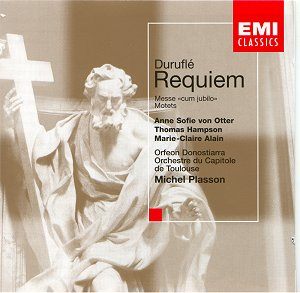Maurice DURUFLÉ (1902- 1986)
Requiem Op. 9 43.46
Mass "Cum jubilo" Op.11. 19.22
Motets sur des thèmes grégoriens. Op. 10 9.06
Notre Père Op. 14 1.36
 Anne Sofie von Otter (mez)
Thomas Hampson (bar) Marie-Claire Alain (organ) Orfeon Donostiarre / José
Antonio Sainz Orchestre du Capitole de Toulouse Cond. Michel Plasson
Anne Sofie von Otter (mez)
Thomas Hampson (bar) Marie-Claire Alain (organ) Orfeon Donostiarre / José
Antonio Sainz Orchestre du Capitole de Toulouse Cond. Michel Plasson
 Recorded 9/10 April 1999.
Toulouse. EMI Classics. 7243 5 56878 2 74.27
Recorded 9/10 April 1999.
Toulouse. EMI Classics. 7243 5 56878 2 74.27

A new Emi offering is an all Duruflé disc of his Requiem, a Mass 'cum
jubilo', and two other works. For the recording two 'name ' soloists are
used, otherwise the entire team involved is French.
Maurice Duruflé was, until his death on 1986, the latest, possibly
the last, in the honoured line of organist / composers which the French seem
to have made their own. His output was not large, and what he did compose
was often changed and revised - often at the instigation of others. For instance,
his Requiem is heard on this latest recording with the 1947 version for mixed
chorus, large orchestra and organ, though versions for choir with organ
accompaniment only, or with chorus and chamber orchestra exist. Another option
available would be the use of boy trebles in performance, a choice not made
on this CD.
Settings of the Mass do not follow a rigidly defined structure. Different
composers select different sections of the ritual and in this case, Duruflé
omits the Dies Irae but includes In Paradisum. The selections
were not arbitrary, but chosen to follow the pattern set by Fauré
and showed his respect for the older composer.
It would be difficult to imagine a less theatrical setting of a Requiem.
No histrionics, no showy bits, the work comes over as a deeply felt, intense
work from a devout man. The orchestra seldom rises above forte and when it
does, the moments are all the more telling. In a work that has no great rhythmic
variety or changes of tempi a certain sameness is inevitable. Compensation
for this is the subtle variety in the orchestral writing.
There is a lot to enjoy in this recording. The orchestral playing throughout
was a delight. There were few calls for showcase playing, rather integration
and cohesion being called for, and given. The chorus throughout sounded like
a well trained and balanced body, with no obvious weakness. The controlled
slow crescendo in the Kyrie was admirably handled and the tympani
led outburst in the Domine Jesu Christe section and the following
magical passage with the womens' voices set against solo organ were memorable.
Thomas Hampson's voice, dramatically clear against some exquisite scoring
for oboe and lower strings, in the Offertory's Hostias,and Anne Sofie
von Otter in an delightful Pie Jesu, soaring away in the big acoustic
sang well. Much as I enjoyed this episode, a degree more of distance to the
mezzo soloist would have given a more ethereal effect.
So, I hear you say, what didn't you like? A recording should be judged by
imagining oneself in a prime seat in the concert hall, or church as in this
case. With a large chorus, a big orchestra and organ and a church acoustic
inevitably some clarity will be lost, as in this recording, and one accepts
this. It is disconcerting, though, to be listening to a unified chorus placed
(correctly) behind the orchestra, then within the same section to hear voices
from the extreme wings giving the illusion of a split choir. An instance
is the womens' chorus in Agnus Dei. At times some audible breathing
distracted (in Lux aeterna at 30 secs, 3.07 and 3.50).
The Mass Cum jubilo, dating from 1966 and the composer's final work
is in five sections. Written for Baritone soloist and baritone chorus with
orchestra and organ it proves to be a brief work of considerable charm. The
score is an open textured delight. Thomas Hampson is featured in the
Gloria and the Benedictus and the chorus with the slightly
unusual job specification is excellent.
When Duruflé was a young man, there was something of a revival of
interest in France in Gregorian chant. His 1960 composition - 4 Motets on
Gregorian Themes - sung a capella showed what a fine body the French Choir
is. The rich acoustic matched the music in a delightful few minutes. No quarrels
with the recording here. The separate parts were clear yet cohesive. Quite
delightful. Our Father (sung in French and unaccompanied) completed the disc.
Reviewer
Harry Downey


![]()